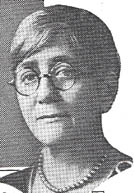Helen Tufts Bailie
Helen Tufts Bailie | |
|---|---|
 Helen Tufts Bailie, ca. 1928 | |
| Born | Helen Matilda Tufts January 9, 1874 |
| Died | May 1962 |
| Nationality | American |
| Known for | Social reformer |
Helen Tufts Bailie (January 9, 1874 – May 1962) was a social reformer and activist. Tufts is known as outing the Daughters of the Revolution for having a blacklist about individuals and organizations, in 1928. This controversy led Tufts to be banned from the organization and to become an advocate for women's, labor, and social rights.
Early life
Helen Matilda Tufts was born in Newark, New Jersey in 1874. In 1875 the family moved to Massachusetts, where Helen would graduate from Cotting High School in 1882. After graduation, she worked as a proofreader and typesetter at Riverside Press. She then moved on to be a secretary at Houghton Mifflin in Boston. In April 1895 she met Helena Born, a writer, anarchist, and labor organizer. Born became a major influence on Tufts' lifestyle and activities; Tufts became vegetarian, acquired an interest in the writing of Walt Whitman, and became active in dress reform, anarchism, communism, and socialism. Through Born, she met William Bailie, who lived in and owned a vegetarian restaurant co-op. In January 1901 Born was diagnosed with uterine cancer and died later that month. Bailie and Tufts lived together starting in the fall of 1901, and in October 1908 the two married. Bailie started a basket weaving business, which he ran until his retirement in 1946. The couple would have two children: daughter Helena Isabel, born in 1914, and son Terrill, born in 1916. The latter would die of spinal meningitis at age 3.[1]
Daughters of the American Revolution
In 1915 Tufts would join the Anne Adams Tufts chapter of the Daughters of the American Revolution (DAR). In 1927 she discovered that the DAR maintained lists of "doubtful speakers." These lists included the organizations such as the National Federation of Women's Clubs, the American Peace Society, and individuals like Jane Addams, William Allen White and Mary Wooley. After investigating, she made the lists public in February 1928. In March she wrote a pamphlet called "Our Threatened Heritage" to protest the blacklists. Fifteen DAR members, called the Committee on Protest, signed the pamphlet and helped to distribute it throughout the United States. At the annual DAR Congress in Washington, D.C., Tufts was accused of "disturbing the harmony" of the DAR organization and harming its reputation, after the pamphlet distributions and her persistence pushing for an explanation about the blacklists. One year later she failed to appeal for reinstatement in DAR.[1]
Later life
After Tufts struggles with DAR and the blacklisting controversy, she continued to be active in the early women's movement and social movements. She formed a letter writing campaign to legalize birth control and one against legislation requiring Massachusetts teachers to take an oath affirming the United States and state constitutions in 1935. In 1947, Tufts and Bailie moved to Nantucket. The couple would move again in 1954 due to Tufts deteriorating eyesight and Bailie's Alzheimer-like symptoms, moving to Yellow Springs, Ohio to live with their daughter and her husband, Water Jolly. In 1956 Tufts book, Darling Daughter, a satire about the DAR blacklists and the red scare, was published. In May 1957 William Bailie would die in a nursing home. Tufts moved to Miami, Florida in 1958 and later to Ft. Lauderdale. She would die in 1962.[1]
Legacy
In 1949 and 1957 Tufts donated her papers to the Sophia Smith Collection at Smith College. In 1949, additional letters related to the DAR controversy were donated.[2]
References
- ^ a b c "Helen Tufts Bailie Papers". Sophia Smith Collection. Smith College. 2001. Retrieved 13 Aug 2011.
- ^ "Helen Tufts Bailie Papers". Sophia Smith Collection. Smith College. 2001. Retrieved 13 Aug 2011.
External links
- Tufts letter "Our Threatened Heritage" written in 1928 and directed towards the Daughters of the American Revolution.
- 1874 births
- 1962 deaths
- American women activists
- American women's rights activists
- Writers from Newark, New Jersey
- People from Boston
- 20th-century women writers
- American women writers
- Anarchist communists
- Daughters of the American Revolution
- American birth control activists
- People from Fort Lauderdale, Florida
- Communist women writers
